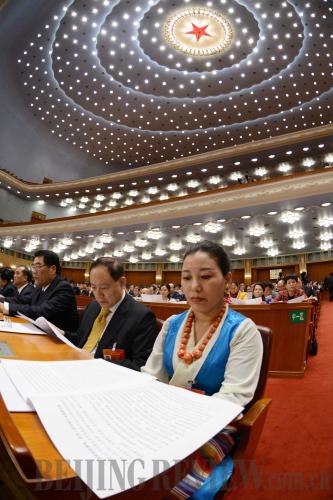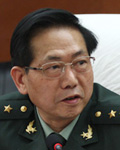|
 |
|
FULLY ABSORBED: Deputies peruse documentation from the Second Meeting of the Third Session of the 12th National People's Congress, which convened in Beijing on March 8 (XINHUA) |
Chinese President Xi Jinping put forward the strategic layout of the "Four Comprehensives"—comprehensively establishing a moderately prosperous society, deepening reform, advancing the rule of law and strictly governing the Communist Party of China (CPC)—during an inspection tour in east China's Jiangsu Province last December. Since then, Xi has reiterated the theory on a number of occasions.
When delivering the Report on the Government Work to lawmakers at the opening of the Third Session of the 12th National People's Congress (NPC), China's top legislature, on March 5, Chinese Premier Li Keqiang also emphasized the "Four Comprehensives" and put forward an array of measures to achieve the goals.
Beijing Review reporters Deng Yaqing, Zheng Yang, Lan Xinzhen, Xu Bei and Cui Xiaoqin spoke to NPC deputies and members of the 12th National Committee of the Chinese People's Political Consultative Conference (CPPCC)—China's top political advisory body—to hear their perspectives on the broad governance blueprint. Edited Excerpts follow:

Shi Zhihong, CPPCC National Committee member, former Deputy Director of the Policy Research Office of the CPC Central Committee
Comprehensively building a moderately prosperous society is the grand goal China vows to realize by 2020. The "Four Comprehensives" was brought forward in late 2014, a critical moment for China as it has less than six years to deliver the goal.
The strategic deployment of the "Four Comprehensives" consists of a strategic objective and three strategic measures. In order to realize the goal of establishing a moderately prosperous society in China by 2020, the measures—comprehensively deepening reform, comprehensively implementing the rule of law and comprehensively strengthening Party discipline—are all indispensable.
Without comprehensively deepening reform, China's development would lack momentum, and Chinese society would have no vitality; without comprehensively advancing the rule of law, the nation couldn't function in an orderly manner; without comprehensively strengthening Party discipline, the governance of the CPC could hardly operate at full capacity.

Wang Xuecheng, CPPCC National Committee member, Director of the Legislative Affairs Office of the Guangdong Provincial Government
In the "Four Compre-hensives" strategic layout, comprehensively establishing a moderately prosperous society is the grand goal, while comprehensively deepening reform is the means to realizing this goal. Comprehensively advancing the rule of law and strictly governing the CPC are fundamental guarantees. In China, to realize the former three requires the leadership of the CPC. Only by strictly governing the CPC and improving its governance capability can the former three targets be realized.
In China, the key to advancing the rule of law lies in a law-based government administration. Only when the government conducts administration in accordance with the law can the authority of the Constitution and other legislation be established, and everyone in society will follow suit. A law-based society will eventually be founded on a law-based government.

Hou Liang, NPC deputy, Mayor of Zhangjiakou, Hebei Province
Advancing the rule of law will rely heavily on the disciplining of government leaders and officials.
Endeavors should be made to ensure that government leaders will never do what is not authorized by law. They need to have a good knowledge of the relationship between power and the law, and make clear the bounds of their power. To this end, the power list system needs to be promoted, and related responsibilities be made clear.
Meanwhile, the power of leadership should be contained and transparent. Leaders should exercise their power in accordance with substantial and procedural laws. If not, the use of power will go off track. In some areas, equality and fairness are still impeded by nepotism, which has undermined the credibility of the government. For one thing, the use of power should be restricted by a system of procedures and rules; for another, the subject, condition, process and mode of wielding power should warrant attention.
Supervision should also be intensified to prevent the power of leadership from being abused. Now, both the Central Government and provincial governments have launched inspection tours to make sure that government leaders can use power in line with laws and regulations. I recommend the Central Government to expand the scope and increase the frequency of inspection.

Liu Jixian, CPPCC National Committee member, former Vice President of the Academy of Military Science of the Chinese People's Liberation Army
Disciplining leaders and cadres is the key to strictly governing the CPC. Stricter management and supervision toward them should be implemented in terms of their work and life.
Party members should be educated on how to more properly use their power and how to administrate based on the rule of law. At work, their power should be restrained and supervised. Each level of leaders should be specifically informed of what they can do, what they can't do and how they should do their jobs. In life, leaders at all levels should be required to maintain a high moral standard so as to be a role model for society.
| 